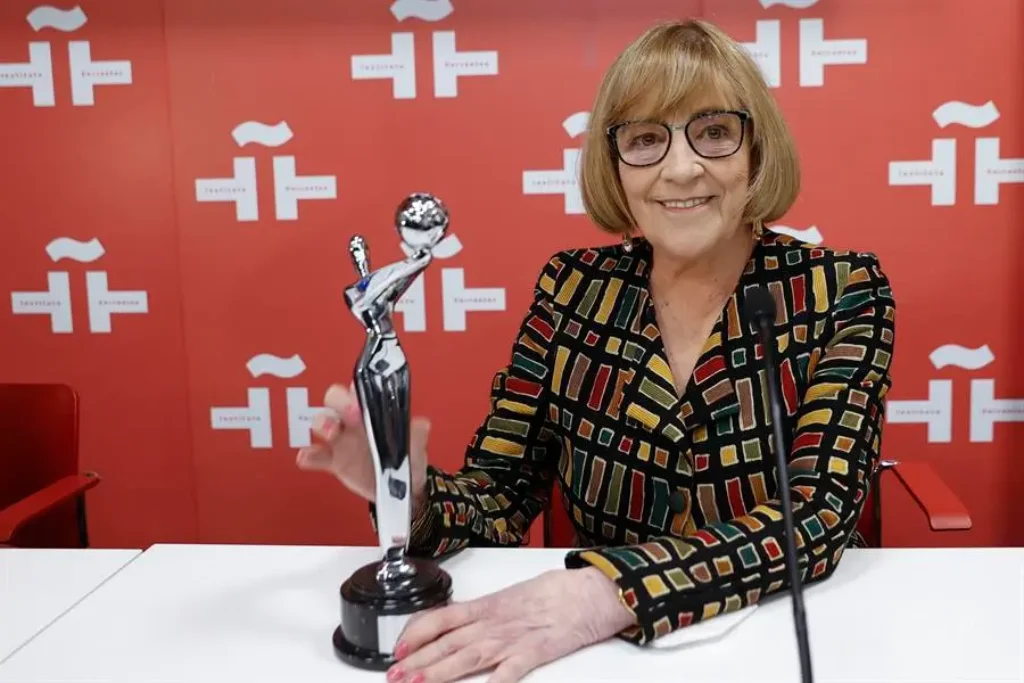Carmen Maura assures that she never had great expectations with her work as an actress, that she came to the profession to have fun, “as if she were going to Disneyland”, and that everything she has achieved so far -more than 50 years of career- is due to having been in the right place at the right time.
“I have been very lucky, one of the things that this profession has is that it is not enough to do it well (…). I have had a guardian angel (…) he has put me in the right place at the right time fair (…), and it also helped me not to have too many expectations” , considers the Spanish actress, who on May 1 will receive the Platinum Award of Honor of Ibero-American Cinema for her entire career at a gala in Madrid.
In an interview he acknowledges that he has been able to influence this enormous (and highly valued) career, with a hundred feature films and sixty other audiovisual projects of all kinds, having always done “whatever he wanted”, from the beginning, he says. “If she had listened, she would not have been a presenter, nor would she have worked with (Pedro) Almodóvar.”
“This award is very nice, and I understand that it is good to be recognized for everything I have done abroad; perhaps this will help some of the many films I have made abroad to be seen,” he says.
Carmen Maura, one of the actresses who worked the most with Pedro Almodóvar in the director’s first professional stage, has developed part of her career outside of Spain, especially in France, as well as being well known in Latin America as well.
“There (Latin America) they love me very much and they treat me very well, with their things, because I’ve had my tricks -he laughs-, but in general working, there has enriched me a lot”.
A message that he reiterated today at a press conference, held at the Cervantes Institute in Madrid, where he appeared together with the president of EGEDA (audiovisual producer rights management entity), Enrique Cerezo, promoter of the Platinum Awards, together with the Ibero-American Federation of Film and Audiovisual Producers (FIPCA).
She continues to be enthusiastic about her work because she doesn’t see it “as a job”, although sometimes everything hurts and she doesn’t like early risers, and she jokes with her warnings when she arrives at a shoot: “Ladies, gentlemen, I’m 76 years old and there are to take care of myself”, she says, amused.
She has lost weight just by rehearsing the French version of “The Swallow”, a play that she has helped to translate into French and which she is enthusiastic about.
She admits that she hasn’t been good at men. “One took my money and another the children, a problem of mine, that I have chosen badly,” she says, but with film directors, it was different. “I love it because right away you make them happy, if you do it right, they immediately adore you.”
She also really likes “not having too much responsibility, that’s why I will never direct a movie (…) I love being an actress,” she says, and more than preferring drama or comedy, for Maura what counts is “the boss.” “The smarter I am, the more fun I have,” she says.
“I really like making people laugh (…) but dramatic roles aren’t bad either because you let off steam. But the ones I love are the really bad ones.”
Actress and muse for directors such as Pedro Almodóvar, Álex de la Iglesia, Mario Camus, Carlos Saura or Fernando Trueba, Maura has won fifty awards, including four Goya Awards, three European Film Awards, a Cannes Palme d’Or, two Conchas de San Sebastián, a César, and the 1988 National Film Award. Now it will also have Platinum.
The Platino Awards for Ibero-American Cinema, promoted by EGEDA (Audiovisual Producers Rights Management Entity), with FIPCA (Ibero-American Federation of Cinematographic and Audiovisual Producers), and with the support of the Ibero-American Film Academies and Institutes, bring together great talents of the industries of the 23 Ibero-American countries, extolling the most outstanding productions and creators of each year with 22 awards and an Honorary Platinum.
Among the nominees for best direction is Salvadoran Tatiana Huezo, for “Noche de Fuego” , who will compete with Spaniards Pedro Almodóvar (“Parallel Mothers”), Icíar Bollaín (“Maitxabel”), and Fernando León de Aranoa (” The Good Boss”).
Brazilian Rodrigo Santoro aspires to the award for best male performance for his role in “7 Prisoners” and Mexican Ana Cristina Ordóñez for best female performance for “Noche de Fuego”.
